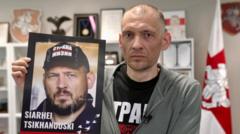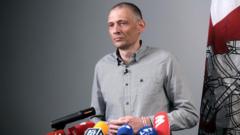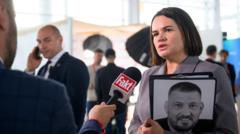In a significant political development in Cameroon, opposition leader Maurice Kamto has been disqualified from the presidential race scheduled for October 12, where incumbent Paul Biya is vying for re-election. The exclusion raises concerns over electoral integrity and democratic participation.
Maurice Kamto Excluded from Presidential Race as Biya Seeks Eighth Term

Maurice Kamto Excluded from Presidential Race as Biya Seeks Eighth Term
The leading opposition figure Maurice Kamto is barred from running in Cameroon’s upcoming elections amid controversy and claims of electoral unfairness.
Cameroon's opposition figurehead, Maurice Kamto, has been officially barred from the upcoming presidential election set for October 12, as only 13 candidates out of 83 submissions were endorsed by the electoral authority, Elecam. At the center of this controversy, Kamto, who finished second in the 2018 elections amid claims of malpractice, has not publicly responded to his disqualification. President Paul Biya, 92, the longest-serving president globally, will pursue an eighth consecutive term, asserting he has much to contribute to the nation despite nearly 43 years in power.
Biya faces challenges from former allies Issa Tchiroma Bakary and Bello Bouba Maigari, both hailing from northern regions known for their voting strength. The recent push by Biya to engage young voters through social media appears to be falling short. Kamto’s removal is attributed to a clash within the Manidem party, where both he and another candidate from a faction claimed representation. Anicet Ekane, the party leader, criticized the decision as “arbitrary and provocative,” suggesting the potential for legal recourse through the Constitutional Council.
Candidates disqualified from the race have two days to contest the decision legally. Kamto is now affiliated with Manidem after the Cameroon Renaissance Movement, the party he represented in the last election, was disallowed from fielding candidates this year due to its absence of parliamentary or local council members. Other candidates granted eligibility include anti-corruption advocate Akere Muna, Social Democratic Front (SDF) chief Joshua Osih, and legislator Cabral Libii, with Patricia Tomaino Ndam Njoya being the sole female candidate on the list.
The political atmosphere is tense, with civil society activists and opposition members voicing their concerns over the apparent measures to curb electoral competition in a country grappling with significant political strife.
Biya faces challenges from former allies Issa Tchiroma Bakary and Bello Bouba Maigari, both hailing from northern regions known for their voting strength. The recent push by Biya to engage young voters through social media appears to be falling short. Kamto’s removal is attributed to a clash within the Manidem party, where both he and another candidate from a faction claimed representation. Anicet Ekane, the party leader, criticized the decision as “arbitrary and provocative,” suggesting the potential for legal recourse through the Constitutional Council.
Candidates disqualified from the race have two days to contest the decision legally. Kamto is now affiliated with Manidem after the Cameroon Renaissance Movement, the party he represented in the last election, was disallowed from fielding candidates this year due to its absence of parliamentary or local council members. Other candidates granted eligibility include anti-corruption advocate Akere Muna, Social Democratic Front (SDF) chief Joshua Osih, and legislator Cabral Libii, with Patricia Tomaino Ndam Njoya being the sole female candidate on the list.
The political atmosphere is tense, with civil society activists and opposition members voicing their concerns over the apparent measures to curb electoral competition in a country grappling with significant political strife.




















